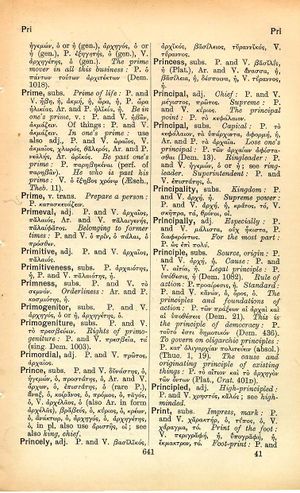principal: Difference between revisions
From LSJ
τὸ κακὸν δοκεῖν ποτ' ἐσθλὸν τῷδ' ἔμμεν' ὅτῳ φρένας θεὸς ἄγει πρὸς ἄταν → evil appears as good to him whose mind the god is leading to destruction (Sophocles, Antigone 622f.)
(CSV4) |
(3) |
||
| Line 9: | Line 9: | ||
<b class="b2">Ringleader</b>: P. and V. [[ἡγεμών]], ὁ or ἡ; see [[ringleader]]. | <b class="b2">Ringleader</b>: P. and V. [[ἡγεμών]], ὁ or ἡ; see [[ringleader]]. | ||
<b class="b2">Superintendent</b>: P. and V. [[ἐπιστάτης]], ὁ. | <b class="b2">Superintendent</b>: P. and V. [[ἐπιστάτης]], ὁ. | ||
}} | |||
{{esel | |||
|sltx=[[ἀρχαῖος]], [[ἔντιμος]], [[εἰσακτικός]], [[γενικός]], [[ἀρχικός]] | |||
}} | }} | ||
Revision as of 07:16, 22 August 2017
English > Greek (Woodhouse)
adj.
Chief: P. and V. μέγιστος, πρῶτος. Supreme: P. and V. κύριος. The principal point: P. τὸ κεφάλαιον. subs. Capital: P. τὸ κεφάλαιον, τὰ ὑπάρχοντα, ἀφορμή, ἡ, Ar. and P. τὰ ἀρχαῖα. Lose one's principal: P. τῶν ἀρχαίων ἀφίστασθαι (Dem. 13). Ringleader: P. and V. ἡγεμών, ὁ or ἡ; see ringleader. Superintendent: P. and V. ἐπιστάτης, ὁ.

